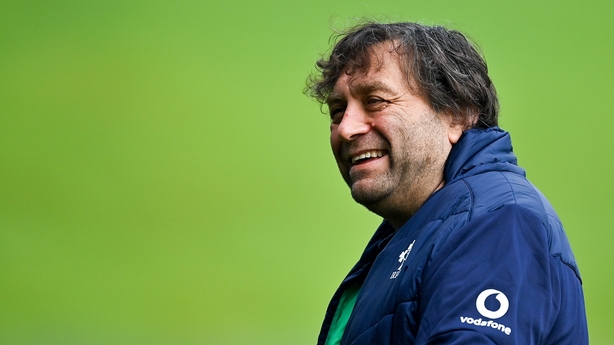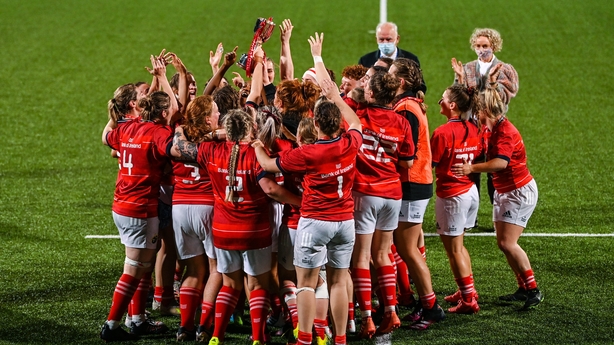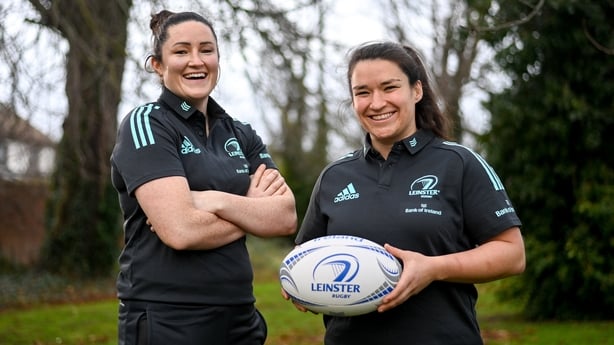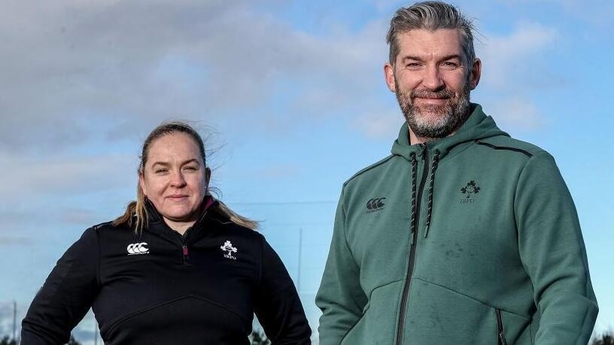If you're a casual fan, it might seem tough to keep up with the current calendar in women's rugby. But such is the pace of change in the game.
The growth has been steady in recent years, but as the rest of the rugby world tries to make up ground on the chasm opened up by New Zealand and England, as well as the hugely successful World Cup a few months ago, the women's game is on a steep, upward trajectory.
The landscape of the game, even in Ireland, is almost unrecognisable to what it was even 18 months ago, although if that lawn had been better maintained it wouldn't have needed a resodding in the first place.
This afternoon, the 2022/23 Women's Interprovincial Series gets under way, with defending champions Munster hosting Ulster, and Leinster entertaining Connacht, beginning a hectic and hugely important year for the women's game.
After three Rounds of Interprovincials, a combined provinces team will come together under the coaching of Ireland boss Greg McWilliams to enter the Celtic Challenge tournament, where they will a representative side from Wales and Scotland respectively, with that competition leading us to the Six Nations, which is settling nicely into it's new standalone home, separate from the men's tournament.
The dilemma facing the game's organisers however, both internationally and domestically, is fitting everything in.
The WXV will be the big addition to Test rugby in 2023, providing more regular competitive games, but also putting an extra strain on the calendar. The opportunity cost in Ireland is likely to be the All Ireland league, as hinted by IRFU performance director David Nucifora (below), who last year said the club game will become a developmental league, rather than the elite competition.

It's likely the Interprovincial series will become a future victim of the schedule. While the inaugural Celtic Challenge will see one team from each of Ireland, Wales and Scotland compete against each other, the long-term goal is to have multiple teams, or maybe even all four provinces entered in an Celtic League over time.
Come back to this article in 12 months time, and it's likely the calendar will have been changed again. It's neither a bad nor a new thing, the early days of professionalism in the men's game saw plenty of trial and error.
For Munster head coach and Ireland assistant Niamh Briggs, the uncertainty has to be embraced.
"At this stage we just have to go with the hand we're dealt with," she said of the ever-changing calendar.
"All women are just craving stability in the game. At the moment it is difficult to get that stability when it is evolving so quickly.
"We were in Japan in August and then three months later there are full-time players. It’s going to be turbulent for the next 12-24 months. And I feel we just need to be patient in how we navigate how we cater for every single rugby player in Ireland. And that really has to be the ultimate goal."
Preparation for this year's Interprovincial series has also been chaotic. With the AIL run off from September through to December, and the final between Blackrock and Railway Union delayed by a week due to the freezing conditions that hit the country before Christmas, it's left a short training window for the provinces, while having to juggle the logistics of Christmas along the way.
"It's come around very fast, with the AIL season flown through," Munster assistant Fiona Hayes told the RTÉ Rugby podcast this week.
"We weren’t sure about the Interpros early days, so it’s been a very, very busy Christmas training-wise, and New Year. The girls are looking sharp, because they’re on the back of that season in the AIL, so they just come out of playing straight into full-on training."

The other spanner in the works for the provinces is getting access to their contracted internationals.
While there are plans for future regional high performance centres, the newly professional players are currently based full-time out of the IRFU's facility in Dublin, and will be unavailable to the provincial coaches for the majority of their training sessions over the coming fortnight.
"We won't have sole access, but we'll work in partnership with the IRFU," said Leinster head coach Tania Rosser this week, who has out-half Dannah O'Brien and centre Aoife Dalton available from the professional ranks, while Leah Tarpey could also become available if she recovers from injury.
"We know that their process is very important now that they're contracted. In fairness to the girls that are involved out there, they've been to every single session even if they haven't trained, so they're always up to speed."
It's a bigger issue for the other three provinces however. With the professionals based in Dublin, and the AIL dominated by clubs in the capital, it means a considerable portion of players across Munster, Connacht and Ulster are clocking up the miles just to train.
"There's been a lot of communication [with the IRFU], the girls have had it laid out early days, that some people mightn’t make training," Fiona Hayes explains.
"But when they get down, the sessions are high-tempo, and intense, so it’s trying to build that amongst the squad, for everyone to realise we’re in a different world, there are some contracted players that mightn’t be able to train twice a week, but it’s not that they’re not training in Dublin."
With the Interprovincial Series being followed closely by the Celtic tournament and the Six Nations, the next three games will be the shop window for those Irish internationals who aren't on the professional payroll.

Leinster co-captains Hannah O'Connor and Christy Haney are among those internationals looking to use their gametime in the next few weeks to make up for the facetime they won't be getting with the Irish coaches in Abbotstown.
Both players were reported to have turned down contracts last year, but remain confident that they can stay relevant to the national selection.
"It's the same as it always was, it’s a massive chance for you to put your best self forward, and get to play alongside girls you normally wouldn't week in and week out, and playing against the best in the country," O'Connor said, ahead of facing her native Connacht this afternoon.
"That’s where you want to be, you want to be pitching yourself at the top tier, both who you’re playing alongside and against.
"Whether the two of us may not be in the contract programme at the moment, things are going in the right direction overall, and it’s a really positive sign of where the things are going. The Interpros are a massive step-up from the AIL.
"You want it to be constant building, the speed of the game and the experience and quality you play against. It’s a really exciting time."
When the Interpros were last played back in August and September of 2021, they were held without the international players who were preparing for their Rugby World Cup qualifying tournament in Italy.
And while the growth of other competitions could see the future Interprovincial championships played without the country's big names, the proximity of this year's competition to the Six Nations does bring it into sharp relevance.
"It's really exciting for them all, this Celtic Cup, it’s added in to the calendar, but I think it’s going to push on those Interpros, and we’re going to see the standard getting better and better," added Hayes.

"The likes of Greg McWilliams and [Niamh] Briggs who is involved in the coaching staff, she’s there and seeing these players in the Interpros. If someone can perform in that intense environment, they’ll be making a big shove to get into that Celtic Cup squad.
"It’s open, if you can play really well, there’s a chance you’ll be seen. And who knows what will happen, you could push yourself into the Six Nations."
Vodafone Women's Interprovincial Series
Saturday 7 January: Leinster v Connacht, Energia Park, 2.30pm; Munster v Ulster, Musgrave Park, 4.45pm.
Saturday 14 January: Munster v Leinster, Musgrave Park, 12.15pm; Ulster v Connacht, Kingspan Stadium, 2.30pm.
Saturday 21 January: Connacht v Munster, The Sportsground, 1pm, Ulster v Leinster, Queen’s University Upper, 5.30pm.


